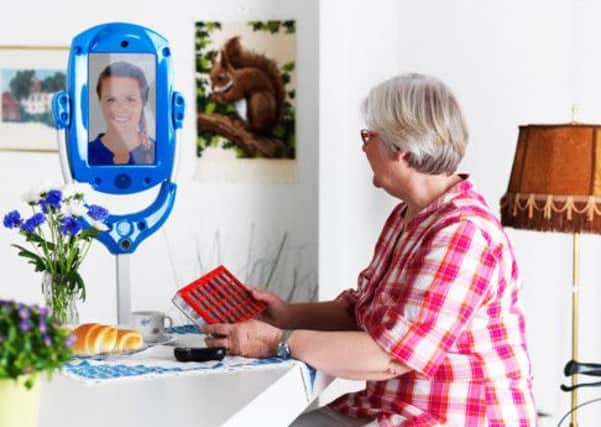Robot trials continue at Scottish island patients' homes


The machines – known as Giraff – have been used in the homes of patients, particularly those suffering from dementia, in the Western Isles and Shetland to allow them to continue living independently.
The robots are designed to allow relatives and carers to keep spot checks on them, potentially from hundreds of miles away.
Advertisement
Hide AdAdvertisement
Hide AdThe screens also allow two-way conversations in a video call system.
Launched in 2013 as a pilot trial, the Giraff robots are just under five feet tall, with wheels, and a TV screen instead of a head.
A relative or carer can call up the Giraff with a computer from any location. Their face can appear on the screen allowing them to chat to the other person.
The operator can also drive the robot around the house to check that medication is being taken and that food is being eaten.
A spokeswoman for NHS Western Isles said: “NHS Western Isles continues to progress in partnership a number of assistive technologies to support individuals in their own homes.
“The Giraff has undergone trial periods both here in the Western Isles and in Shetland.
“We are expecting the evaluation from Shetland shortly.
“The Giraff is but one of many technologies we are exploring and can deploy, and plan to share the fuller range at an event in Stornoway within the next two months.”
The spokeswoman added: “The use of assistive technology is to some extent a bespoke development centred on the needs of each individual, and. as such, the Giraff would have a specific rather than a generic application.”
Advertisement
Hide AdAdvertisement
Hide AdHealth board bosses said earlier trials in Australia showed that people with dementia were not afraid of the machines. They hope the robots will help people living alone in remote areas to feel less lonely.
Personal healthcare robots such as Baymax in Disney animation Big Hero 6 may not be far from becoming reality, a Scottish university suggested last year.
In the film’s futuristic world, Baymax is a robot with a soft synthetic skin who can detect medical conditions.
The University of the Highlands and Islands suggested a new era of smart healthcare devices could be imminent.
The Highlands and Islands has previous form for exploring the use of smart technologies and robots in healthcare.
Early versions of a robot teddy bear now being put through its paces in a children’s hospital in the US were tested in the Highlands.
An updated version of the bear has been fitted with pressure sensors on two of its paws and several touch sensors throughout its body parts.
Advertisement
Hide AdAdvertisement
Hide AdThe screen of the smart phone device in the robot’s head shows animated eyes and the robot can use the phone’s internal speaker, microphone and camera for sensing changes in a child’s wellbeing.
The early prototype of Huggable was brought to Scotland by MIT Media Lab in a project supported by Highlands and Islands Enterprise (HIE).
The UHI Millennium Institute - now the University of the Highlands and Islands - was also involved.